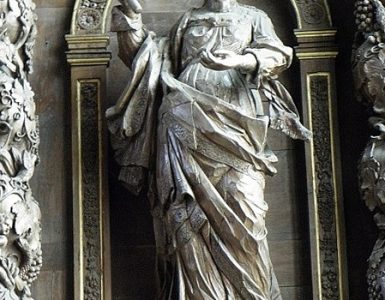Devotion in honor of Mary is one of the characteristics of Catholic faith and life. It is not only among Catholics that Mary is popularly venerated. The Orthodox churches, the churches of the Anglican communion, Lutheran churches and indeed many others celebrate Mary, the Mother of Jesus. Nor can it be overlooked that the Virgin Mary, as Maryam or Mariam, has an honored place in Islam.
Our Gospel reading for the feast day is Luke’s account of Mary’s visit to her cousin Elizabeth. Mary is almost bursting with the desire to share the news that she is with child. An amazing thing happens when the cousins meet: the elderly Elizabeth is “filled with the Holy Spirit” and the child in her own womb “leaped” for joy. Elizabeth will give birth to John the Baptist who will help to prepare the way for Jesus who will soon be born of Mary.
All of this is the work of the Spirit and is to be seen as part of the preparation for the entry of the Son of God into our world. Mary and Elizabeth may seem to be the main actors in the drama of today’s Gospel reading. But it is Jesus who gives full meaning to Mary’s visit to her cousin. In a curious manner the unnamed, unborn and “hidden” Jesus is the more important of all involved in this Gospel story.
And this is precisely what Mary celebrates as her heart breaks out into song and she proclaims: “My soul proclaims the greatness of the Lord; my spirit exults in God my Savior.”
Mary’s Magnificat is part of the evening prayer of all who pray the Church’s Liturgy of the Hours (or the Breviary). Every evening priests and monks, men and women religious throughout the world, pray the hymn in which Mary recognizes the gracious work of God that had taken place in her. It is a hymn of greatness but of a greatness that is humble. It is a hymn that praises the mission Mary’s Son will have. The proud will be replaced by the lowly “little ones” of the world; the mighty will be cast down from their thrones of worldly power while the lowly will be raised on high; what is so often thought to be riches that satisfy us will be shown to be empty of real worth.
Elizabeth can see that Mary has been blessed as one who believed that what was spoken to her by the Lord would be fulfilled. In her own praise Mary celebrates God’s fidelity to the promises he has made to his children of all ages, to all of us. Today we can pray to honor Mary by living the values of her Magnificat, finding true greatness in honest lowliness.










